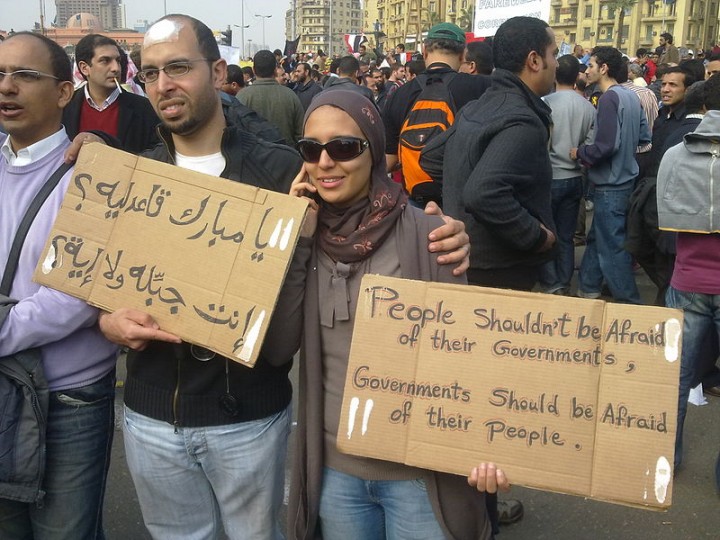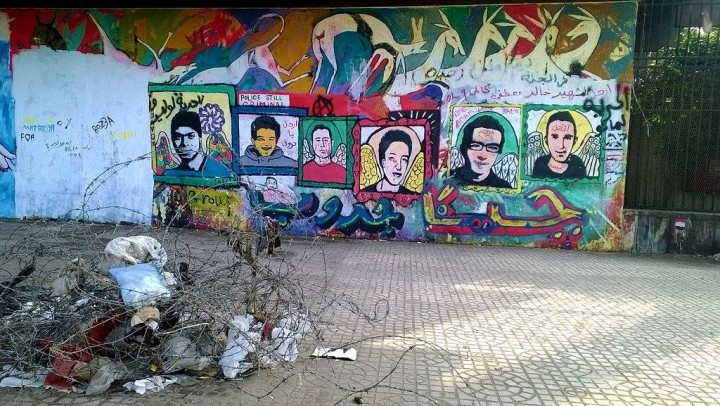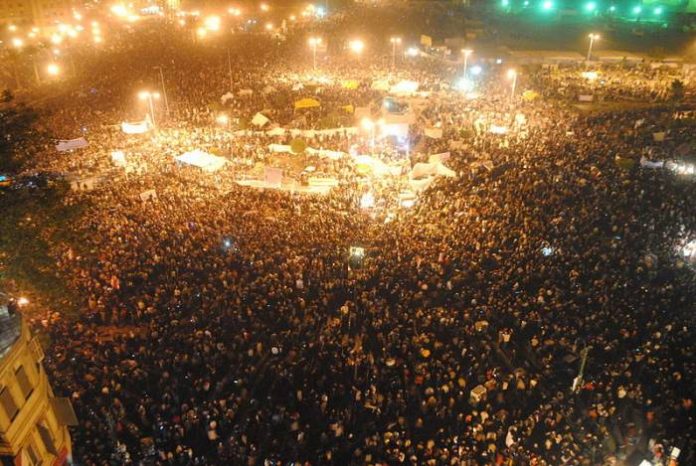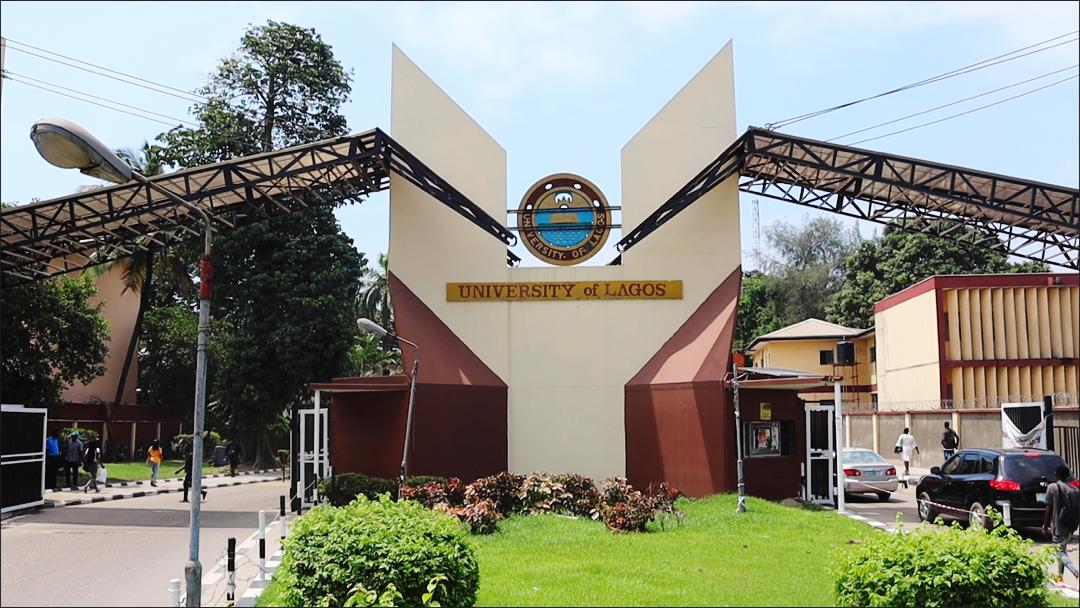Mohamed Hossam 10 March 2021. From In Defence of Marxism
The following article is based on a speech delivered by an Egyptian Marxist for a gathering of Marxists in Britain. He explains the importance of learning the lessons of the tremendous 2011 movement, and the need to prepare for future explosive developments in the near future.
A decade has passed since the Egyptian Revolution. This was a decisive turning point in the history of the Middle East. Internationally, it was an opening shot of an epoch of revolution and counterrevolution. Without any leadership, organisation or programme, the Egyptian masses stormed heaven, to paraphrase Marx. Within a matter of 18 days, they faced down a powerful, brutal state apparatus made up of hundreds of thousands of police officers, soldiers and bureaucrats – and they won!
This is a testament to the enormous power and potential of the working class and poor, who achieved far more in a matter of days than liberal and reformist so-called experts and professional politicians accomplished in decades. Freedom of speech, organisation, and other democratic rights were achieved by the Egyptian masses, not via petitions or negotiations, but by their direct and independent intervention in the sphere of politics.
And yet, all of those achievements are being gradually clawed back by the ruling class, by the counterrevolutionary Sisi regime, which came to power in July 2013. Egyptian Revolutionaries today live with the deep wounds of defeat inflicted by this counterrevolution. How did this happen? This was a revolution, which could have changed the course of world history. This is said neither to boast nor to mourn, but to highlight the chance that was missed, and to emphasise the importance of learning the lessons in order to prepare for the next revolutionary tide.
Today, Egyptians suffer under a military dictatorship, where revolutionaries are threatened with imprisonment at any moment. We are living through a brutal economic and social war. The consequences have been paid and will continue to be paid by the working class and popular masses, in the midst of the greatest economic crisis capitalism has ever faced. In this drained and exhausted society, there is a need to stop and consider the mistakes that led us here, where fear and suppression are widespread, where a political void has been filled by the army’s clenched fist, half the population live in poverty, and the government schemes to elevate capitalists to the status of gods, ruling over the masses. These difficult circumstances have driven many to despair.
This state of affairs, however, will not last. Far from being omnipotent, the Sisi regime is preparing the way for new revolutionary upheavals. But in order to guarantee the success of the coming movements, we must seriously study our past experiences and our mistakes and prepare for the future, so as not to become prisoners of our own past.
Nothing comes from the void
Revolution is the ultimate point in the quantitative accumulation of the class struggle. Thirty years under the rule of Hosni Mubarak and his clique provided all the necessary impetus for the uprising and social upheaval of 2011.
In this period, a war between two right wings (the Islamists and the state) raged for more than a decade. Privatisation and the widespread sale of public assets to national and international capitalists (on a scale that has now been surpassed, but which was unprecedented at the time) saw the Egyptian market opened up to imperialist penetration. This was the course of development that former president Anwar Sadat had set in motion before he was killed. The Egyptian economy became more and more a fragile rentier economy. Meanwhile, the government committed crimes in the political arena (during the second Palestinian Intifada in 2000, the American aggression in Iraq in 2003, and the bombing of the Gaza Strip in 2009) that had a profound impact on the Egyptian masses and youth.

The economy was achieving high growth rates, leading to the enrichment of a small percentage at the top. By contrast, most of the youth were seeking to emigrate, some even in wooden boats, to escape the hellhole the country had become. Public services were left to decay; the secret police force operated everywhere and kept tabs on everyone; the brutality of the regular police force (especially against the poor) sometimes resulted in people dying under torture in police stations; and ordinary Egyptians were completely shut out from politics.
This was the basis of a growing mood of anger, and a ferment amongst the workers and youth. This was reflected in a radical movement starting in 2000, which witnessed its peak during the 2008 strike in Al Mahala, the largest factory in Africa. This was also at the same time as the global economic crisis, which had a big impact on Egypt. Meanwhile, a scheme to pass on power to Mubarak’s son caused a crisis within the ruling class. All of this combined into a perfect storm, opening the path for a revolutionary outbreak. Similar to the conditions laid out a century ago by Lenin for a revolution: we saw a crisis at the top, the ruling class’s difficulty in controlling the masses in the old ways, and an economic and political crisis that radicalised some layers of the middle class, especially the youth.
The revolution that broke out in Tunisia, and brought Zein Al Abedi Ben Ali down, was like a catalyst for the Egyptian masses and youth. Days before the revolution, protesters shouted: “a revolution today in Tunisia, tomorrow in Egypt!”
The great revolution
The masses rose up against the bullets, armored police vehicles and thugs of the government. In these daily clashes, the protesters showed great heroism and sacrifice. They took over the streets and the squares, which forced the police to back off, fleeing before the angry masses, who stood their ground for several days. Meanwhile, the government was in a state of panic, trying to sway them with both sweet words and threats, until the working class intervened fully and began a series of strikes, starting on 7 February. At this point, the military council and the imperialist forces realised that there was no choice but to give up and remove Hosni Mubarak from power.
The masses felt their ability to determine the course of events. They didn’t know what exactly they wanted but they knew what they didn’t want, and in the absence of leadership, the common course of action was spontaneous. It was inevitable that the masses would learn from experience, and the tough school of revolution.
After the departure of Hosni Mubarak, the military council (which the protestors were demanding should leave) made an alliance with the Muslim Brotherhood, and manoeuvred, with the help of US imperialism, to restore the stability of the regime. The masses didn’t want the military council, but had illusions in the Muslim Brotherhood, as one of the few opposition movements that had been allowed to operate under Mubarak. Typically of the Islamist parties, the Muslim Brotherhood played the underdog card under Mubarak’s leadership, and a number of so-called “revolutionaries” and self-styled “Marxists” helped in entrenching illusions that it could be a party of reform under the pressure of events. By peddling this nonsense, they stained the banner of revolutionary socialism and Marxism in Egypt.
When the Mulsim Brotherhood assumed control and followed the same old capitalist economic policies, formed alliances with the military council and used the police against the protestors, the people realised that they were no different from the military council or Mubarak. They understood the Muslim Brotherhood only defended their own interests, as a part of the ruling class.
This in turn led to the second revolution of 2013. However, in the absence of a true revolutionary leadership and given that the forces on the left, such as the Revolutionary Socialist organisation, had discredited themselves with their “critical” support of the Muslim Brotherhood, the representatives of the old regime stepped in to fill the vacuum of power left by the downfall of the Morsi regime. With the treacherous support of the liberals and reformists, the big bourgeoisie, the army and the Mubarak-era state bureaucracy took power presenting itself as a representative of the masses.
The continuous escalation of the open class struggle, however, was finding no solution to the problems faced by the masses, and was wearing the people down. Three years after the revolution, with no real achievements, the economic situation became much harder, prices were rising exponentially, and there were social convulsions and an increasing unemployment rate. In the face of all of this, democracy becomes nothing but an empty word for the workers and the poor. Bourgeois democracy can be useful for paving the way for the class conflict. But the class struggle was now ebbing and the counter-revolution was on the offensive. In spite of all the heroism of the masses, who had again and again defeated the counter-revolution, the main levers of power, production and economic resources remained in the hands of the same capitalist class, and the capitalist state remained intact. The blame for this tragedy can be placed solely at the feet of the so-called revolutionary leaders, the leftists, the socialists and the trade union leaders, who refused to call for the expropriation of the capitalist class, or the overthrow of the capitalist state. Instead, they wasted precious time, and consequently sacrificed many lives, tail ending either the Muslim Brotherhood or the liberals, both of whom were fully wedded to the capitalist system.
In such conditions, the ruling class and forces of the old regime saw the chance to take advantage of the masses’ discontent with the Muslim Brotherhood. It was able to wear them down by promising stability, and blaming the Muslim Brotherhood alone for the crisis of the system. By this time tiredness was setting in and the masses were yearning for stability, as opposed to constant struggles without any perspective. In the end, the capitalist forces assessed the situation much better than our so-called “intellectuals”, “revolutionaries” and s0-called “Marxists”, who took the lead in the opposition and revolutionary movement. At every turn, they proved to be more class conscious, more consistent and better organised than the leaders of the revolution. While the leftist leaders were talking about ‘educating the ignorant masses in the spirit of democracy’ the counter-revolution was getting ready to strike back.
Our so-called revolutionary leaders did not understand what Lenin realised more than 100 years ago, i.e. that the bourgeoisie in countries such as Egypt will eventually tend to establish a dictatorship, and that any democracy after the revolution is only accomplished through the escalation of the class struggle and the revolutionary tide, a tide that was now beginning to ebb. Lenin wrote in 1905:
“The bourgeoisie as a whole will inevitably turn towards counter-revolution, toward absolutism, against revolution, and against the people. And as soon as its narrow and selfish interests are met, it will give up consistent democracy (and it has already begun to abandon it!)”
The “revolutionaries” in Egypt didn’t understand that the only way to maintain the democratic gains we won in the revolution was by deepening the revolution itself, until the working class held political and economic power in its hands, and could work on improving industry, agriculture, education and health. In other words, it would have to take the first steps in the socialist transformation of society.
In the end, the class war has to be won by one of the two main contending classes: with either the working class leading the poor to victory, or the restabilisation of bourgeois rule. The latter can’t offer any concessions and has very little room to manoeuvre, especially in times of economic crisis. This means, in the case of Egypt (and other countries in the region, like Sudan) that the military will intervene in the end, announcing the continued domination of the bourgeoisie over society.
In Egypt, what happened, in the absence of a revolutionary leadership to guide the working class and the poor to victory, was that the revolution reached a dead end. So the military stepped in, took advantage of the public’s anger against the Muslim Brotherhood, along with society’s exhaustion, and emphasised the need to get back to a somewhat normal life after three years of protests and strikes. Once firmly in the saddle of course, the counter-revolution went onto the offensive, attacking all the gains of the revolution and jailing tens of thousands of revolutionaries.
Revolution betrayed
The left-reformist parties, and even some organisations claiming to be revolutionary and Marxist, betrayed the revolution, the working class and the masses. Lenin once said: “in the revolution there is no difference between intentional or unintentional betrayal”. That is correct. All betrayals lead to defeat, leaving us with the heavy debt of casualties, prisoners and increased repression. Worst of all, defeat means we miss the opportunity for a revolution. We don’t know when such a chance will come again.
For Marxists, the liberals, the Muslim Brotherhood and other Islamists, capitalists and generals are all clearly class enemies. There is no hope of changing or forgiving them, and it is not these groups I am criticising here.
Those who took the lead on the revolution’s side, the left and the so-called Marxists, made a lot of mistakes, which must be admitted. The integrity and honour of a person or party is not dependent on making no mistakes, but publicly and fully admitting to one’s mistakes; then understanding what led to them and offering assurances not to repeat them. This was a crucial process in the development of the working-class movement in the past 200 years. Marx, Engels, Lenin, Trotsky all made mistakes but were able to admit to and learn from them. By that standard, we don’t have a single political party or organisation with any integrity or honour in Egypt.

The left in the Egyptian Revolution was divided into two major camps. First, there are those who supported the military’s restoration of “stability”, even if it meant tanks entering the streets, allegedly to stem the Islamic and Wahhabi tide, and defend civil life. In this camp are the Stalinists, Nationalists and Nasserites. On the other hand, we have those who supported the Muslim Brotherhood, even covertly, believing they were defenders of democracy, and would ensure the old system did not return. Between these two camps, many revolutionary opportunities were lost and many of the best revolutionary youth were killed, arrested or exhausted. These were the only forces that could be relied upon to build the working-class party and secure the victory of the revolution.
From the left reformists and Nasserites like Hamden Sabahy, who shook hands with the liberals, to the old system’s frontmen and the generals, to the deadweight bootlickers of the military in the Communist Party and National Progressive Unionist Party, to the so-called “revolutionaries” who supported the Islamic reactionaries in the name of a “lesser-evil” policy, which ultimately only created the conditions for the emergence of a greater evil, they all betrayed the revolution and the working class, to varying degrees.
To be frank, the reason for our so-called leaders’ betrayal wasn’t their lack of knowledge of Marxist theory, but their lack of trust in the masses and working class. For these intellectuals, “the masses had too little consciousness and too many illusions; they couldn’t understand our message; the time was not right, and neither were the circumstances. Society is not ready, and will never be.” But these ladies and gentlemen have forgotten, perhaps deliberately, that their precise task is to guide the masses onto the path of victory, to tell the truth and dispel reformist illusions. If the working class was fully aware of its class character and historical mission, and not affected by the ideas and propaganda of the ruling class, then why do we need a revolutionary party in the first place?
To imagine the masses, as soon as they rose in revolt, would realise their class mission, become aware of the nature of the capitalist system, and get rid of the ideas spread by the ruling class is an idealist, mechanical and naive conception. Lenin said that those “who imagine a pure socialist revolution will not live to see one, that person always speaks about the revolution without understanding what it is.” This is a fair summary of many of our so-called “Marxist leaders”.
To be blunt, there is not a single left or Marxist party in Egypt that has tried to change society or bring down capitalism. Either they tried to get a share of the pie (as was the case with the reformist traitors), or they tried to manoeuvre within the Egyptian political process: forming opportunistic alliances with the aim of appearing in the media, under the pretext of communicating with the masses and not being isolated. The people actually struggling in the movement were miles ahead of these characters. In the Egyptian Revolution, the left in all its guises simply tailed the right in one way or another, and by doing so they all discredited Marxism and revolutionary socialism.
Where are these parties now? And what did they gain from the revolution? In truth, they failed at everything: they all came out of the revolution weakened numerically, they lost a lot of their activists, they failed to enhance their connection with the workers and popular masses, and of course they failed to help in developing a revolutionary and class consciousness within society. On the contrary, all of them spread reformist and reactionary illusions, which led seamlessly to class collaboration. More importantly, they led many workers and revolutionary youth to death or arrest. Meanwhile, those who survived, were demoralised and turned away from Marxism and revolutionary socialism. This is their most criminal act, which will require a great effort to overcome, and to restore the genuine revolutionary Marxist banner.
Trotsky brilliantly exposed these kinds of “leaders” when he wrote:
“For the majority of socialists – and I mean the upper echelon – their socialism is nothing but a side issue, nothing but a secondary preoccupation corresponding to their leisure hours. These gentlemen devote six days of the week to their liberal or commercial professions, improve their fortunes well enough, and on the seventh day agree to devote themselves to the salvation of their souls […] It is clear that a large number of these gentlemen have succeeded in masquerading as communists. These are not intellectual opponents, but class enemies. […] Nothing is more disgusting or more dangerous in revolutionary activity than the petty bourgeois, conservative, self-satisfied amateur, incapable of sacrificing for the sake of a great idea.
“The advanced workers must firmly adopt one simple but steadfast rule, which is that those leaders or candidates for leadership who are, in normal peaceful days, unable to devote their time, talents, and money to the cause of communism, are most likely to turn, in the revolutionary period, into traitors or to be traitors. They move to the camp of those who are waiting to see who will be victorious.” (The Tasks of the American Opposition, 1929).
Was there another path?
The question remains: was there any hope for victory? Could our endeavours have resulted in anything but defeat?
It was indeed possible to succeed – given the objective circumstances, the raging class struggle, and the explosive regional and global situation – had there been a revolutionary party to take advantage of the three-year revolutionary tide. During these three years, there was not a single factory, institution or university that didn’t announce an act of disobedience. Even a small revolutionary party, raising the flag of class independence, pushing revolutionary propaganda, following Lenin’s advice to “patiently explain”, and working on uniting the workers and revolutionary youth, could’ve emerged triumphant.

Let us remember that the Bolshevik Party in November 1917 had about 8,000 active members in a country with a population of about 150 million. The Bolshevik revolutionary banner was devoid of any bargains and concessions, and its activists patiently explained to the workers that a prerequisite to solve their problems was the seizure of power and the overthrow of capitalism. It was hard and patient work to clarify the ideas of the mass movement. After eight long months, full of difficulties, the Bolsheviks were able to lead the workers to power and eradicate capitalism. In that time, many Bolshevik leaders, including Lenin himself, were at risk of getting killed or arrested. But that didn’t stop them, nor lessen their courage and belief in their just cause. Meanwhile, in Egypt, our so-called revolutionary leaders prioritised their personal safety, under the pretext that the masses’ consciousness was not mature enough and they wouldn’t understand their “message”.
If there had been a party taking advantage of the revolutionary tide and providing it with a compass and programme, things would’ve been very different. We went from the explosive first 18 days, through the uprisings of Muhammad Mahmoud street, to the rise of the Council of Ministers, the Maspero demonstrations, and ending with the protests that occurred after the first 100 days of Muhammad Morsi’s rule, followed by those on 30 June. During and after these events, there were hundreds of demonstrations and protests by workers and students, and mass strikes. A revolutionary organisation with a Marxist programme could have connected with these struggles. It could have patiently explained to the workers and revolutionary youth that there was no way of achieving the simplest economic, democratic or social demands, unless the masses, led by the working class, seized power and overthrew capitalism. If, during those years, work had been done to win the vanguard in every protest and strike, through continuous and persistent agitational work to invite the masses of workers, the poor and the revolutionary youth to organise under the banner of socialist revolution, a true revolutionary organisation could have been built, that would have made a decisive difference to the course of events.
If this had happened, the probability of victory would have been very high. When the masses dispensed with their reformist or reactionary illusions through lived experience (and this experience is of a rapid pace in times of revolution) they would have turned to a revolutionary solution, a clean revolutionary banner, and an organisation that told them the truth and alerted them to what they would be facing.
What happened instead is that, in the absence of a revolutionary solution, the state, represented by the armed forces, exploited the exhaustion of the masses and their desire to reach some kind of way out of the impasse. This, along with the impotence and betrayal of the reformists and the so-called “revolutionaries”, allowed the military to rise above the rest of society and declare itself ruler and judge over the people. That is, it could present itself as an arbiter between the classes, working to preserve the capitalist system, and putting an end to the revolution by armed force.
Towards building a revolutionary Marxist organisation
On the revolution’s 10th anniversary, after all the betrayals, and after years of despair, frustration and nihilism, it is time to rebuild, and set about building a revolutionary organisation based on our past experience, with a sober analysis and critique of what went wrong. This organisation must be armed with Marxist theory, the only means to understand the situation objectively, tangibly and scientifically, and to explore the possibilities of the future.
We must study Marxist theory. Let us remind ourselves that the first thing Lenin did after the defeat of the 1905 revolution was reground himself and the Bolshevik Party in theory. We must organise groups and seminars for theoretical study, taking into account the security risks. We must find ways and means to study and discuss Marxist theory, without risking the safety of ourselves and others. Meetings should be kept small and linking up across study groups should be kept to a minimum.
Let us begin the theoretical preparation and accumulation of forces for serious organisational work. One of the biggest sins of those organisations that presented themselves as Marxist in the Egyptian Revolution is that they neglected theory and fell into the trap of excessive activism with no results. This is also one of the reasons why their numbers decreased dramatically after the defeat of the revolution, because they did not theoretically prepare the youth and cadres. So many flew the most revolutionary banners at the time of the revolution’s high tide, with no theoretical basis except for excessive enthusiasm, and abandoned these banners when the movement entered its ebb.
We must work to build a Marxist organisation that carries a revolutionary banner untainted by class betrayals. Let us create revolutionary cells everywhere we are, and everywhere we can reach. With no theory there is no analysis, and without analysis there is no organisation. The most famous line of Lenin is: “no revolutionary movement without a revolutionary theory.” The organisations that claimed to be Marxist in the Egyptian Revolution were guilty of both class betrayal and the neglect of theory.
Conclusion
Today, amidst the deepest and most complex capitalist crisis the world has ever witnessed, after the defeat of the Egyptian Revolution and many others in the region, here we have begun to witness a new revolutionary current in many countries around the world. In the Middle East, we see the beginning of huge protests in Tunisia, demolishing the myth of democratic transformation there, and starting a new chapter in the class struggle. We are living in the most turbulent period, and there is no place on earth that is safe from the intensification of class struggle. This was demonstrated by the events in the United States of America on 6 January. Egypt, of course, is no exception. Everything that has happened in the past ten years, domestically and internationally, and the current crisis prompted by the pandemic, will have major effects on the consciousness of the revolutionary youth and workers.
We saw some sporadic protests beginning in 2019, in addition to popular resistance against the Reconciliation Law last year, and the heroic workers’ struggles and strikes in the Delta Fertiliser Company, the Iron and Steel Company, along with many more battles against layoffs, pay deductions, and the sale and liquidation of public companies. It is true that these struggles still erupt defensively and are laden with the heavy burden of reformist illusions, and sometimes narrow economic and trade union illusions. The working class has been pushed onto the defensive. However, underneath the surface, burning anger and hatred towards the regime exists, which must come to the fore sooner or later. The Sisi regime appears strong, but in reality, it is profoundly weak. It only survives due to the temporary retreat of the workers, who are disoriented and tired after years of struggle, which did not reach a final resolution.
The most important thing is that we have a generation of revolutionary youth and activists who have learned from and grown up in the aftermath of the Egyptian Revolution. They experienced its ebb and flow, and have learned lessons of the past. Despite what our pessimistic intellectual friends would like to imagine, the future will see many more revolutionary events.
Next time, however, we Marxists must be prepared. We must also have a sense of urgency in preparing for this future. Lenin, in 1916, less than a year before the Russian Revolution, under the weight of despair and frustration, said: “Most likely, our generation will not witness the socialist revolution”. But this frustration did not lead this iron fighter to surrender or fall into nihilism. Rather, it pushed him forward towards building the tool necessary to win the revolution and overthrow capitalism, even if he would not live to witness it. That tool is the revolutionary party.
Glory to the martyrs and freedom for the detainees!
Towards building a revolutionary Marxist organisation!
Down with the forces of repression of the masses: the police and the army!
Down with the capitalists’ government!
There is no solution but the victory of the socialist revolution and the establishment of the workers’ government!





